Report on Entrepreneurship: Venture Types, Traits, and UK Economy
VerifiedAdded on 2023/01/19
|21
|5234
|37
Report
AI Summary
This report provides a comprehensive overview of entrepreneurship, exploring various venture types such as small businesses, scalable startups, large company entrepreneurship, and social entrepreneurship. It examines the impact of small and medium-sized enterprises (SMEs) on the UK economy, highlighting their contribution to employment and economic growth. The report delves into the characteristics, traits, skills, and motivational drivers of successful entrepreneurs, analyzing how these factors contribute to entrepreneurial success. Furthermore, it discusses how family background and personal experiences can influence entrepreneurial motivation. The report also includes a comparison of different entrepreneurial typologies, including lifestyle, small growth, and high-growth ventures, and analyzes the similarities and differences between public, private, and social sectors. The report aims to provide a detailed understanding of the entrepreneurial landscape and the factors that contribute to entrepreneurial success.

Entrepreneurship and
Small Business
Management
Small Business
Management
Paraphrase This Document
Need a fresh take? Get an instant paraphrase of this document with our AI Paraphraser

Table of Contents
INTRODUCTION...........................................................................................................................1
LO1 Explore and illustrate the range of venture types that might be considered entrepreneurial...1
LO2 Statistics to demonstrate the influence of SME’s over UK economy.....................................6
LO3 Characteristics, traits, skills and motivational drivers of successful entrepreneurs................7
LO4 Characteristics of entrepreneurial personality reflect entrepreneurial motivation..................9
CONCLUSION .............................................................................................................................11
REFERENCES..............................................................................................................................13
INTRODUCTION...........................................................................................................................1
LO1 Explore and illustrate the range of venture types that might be considered entrepreneurial...1
LO2 Statistics to demonstrate the influence of SME’s over UK economy.....................................6
LO3 Characteristics, traits, skills and motivational drivers of successful entrepreneurs................7
LO4 Characteristics of entrepreneurial personality reflect entrepreneurial motivation..................9
CONCLUSION .............................................................................................................................11
REFERENCES..............................................................................................................................13
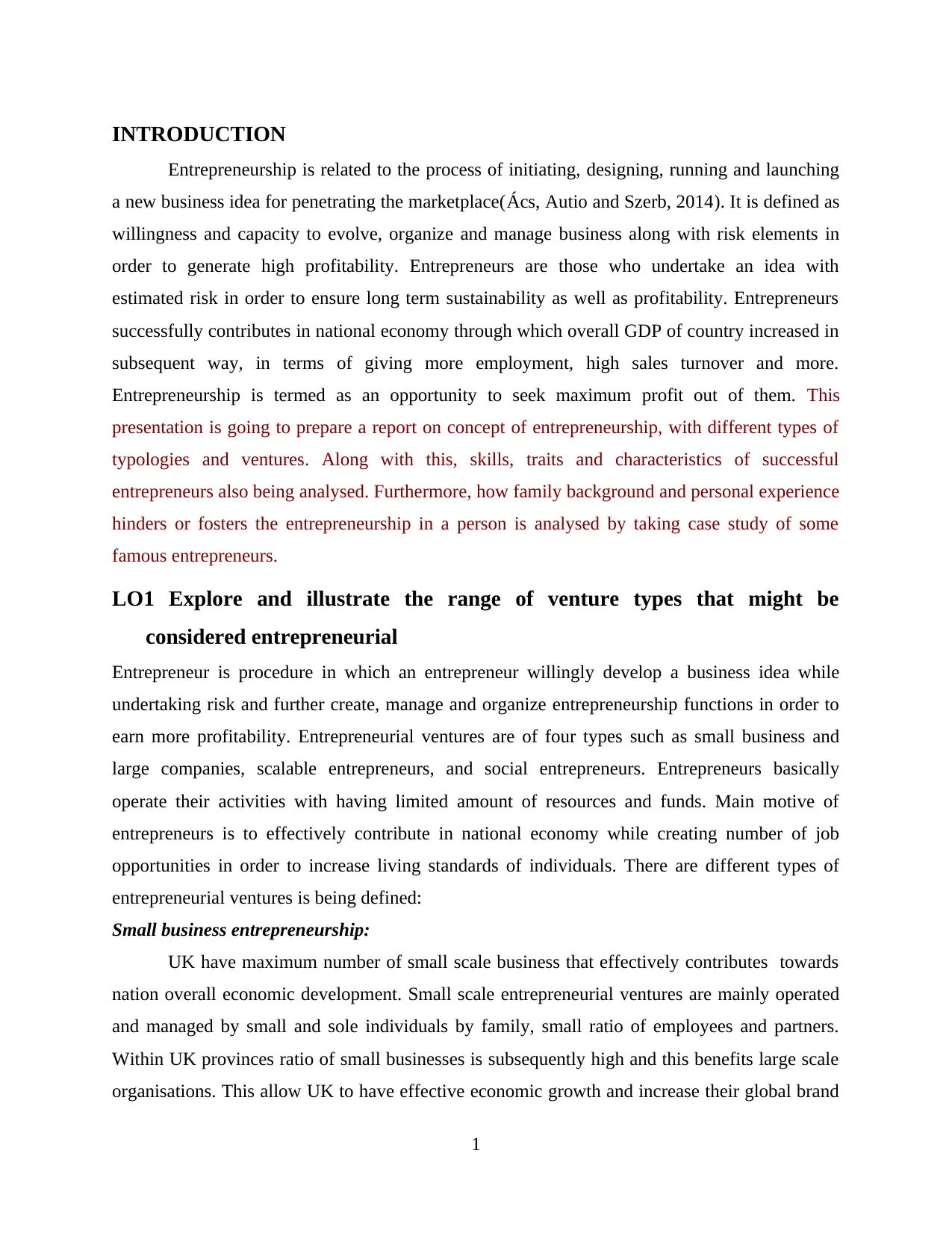
INTRODUCTION
Entrepreneurship is related to the process of initiating, designing, running and launching
a new business idea for penetrating the marketplace(Ács, Autio and Szerb, 2014). It is defined as
willingness and capacity to evolve, organize and manage business along with risk elements in
order to generate high profitability. Entrepreneurs are those who undertake an idea with
estimated risk in order to ensure long term sustainability as well as profitability. Entrepreneurs
successfully contributes in national economy through which overall GDP of country increased in
subsequent way, in terms of giving more employment, high sales turnover and more.
Entrepreneurship is termed as an opportunity to seek maximum profit out of them. This
presentation is going to prepare a report on concept of entrepreneurship, with different types of
typologies and ventures. Along with this, skills, traits and characteristics of successful
entrepreneurs also being analysed. Furthermore, how family background and personal experience
hinders or fosters the entrepreneurship in a person is analysed by taking case study of some
famous entrepreneurs.
LO1 Explore and illustrate the range of venture types that might be
considered entrepreneurial
Entrepreneur is procedure in which an entrepreneur willingly develop a business idea while
undertaking risk and further create, manage and organize entrepreneurship functions in order to
earn more profitability. Entrepreneurial ventures are of four types such as small business and
large companies, scalable entrepreneurs, and social entrepreneurs. Entrepreneurs basically
operate their activities with having limited amount of resources and funds. Main motive of
entrepreneurs is to effectively contribute in national economy while creating number of job
opportunities in order to increase living standards of individuals. There are different types of
entrepreneurial ventures is being defined:
Small business entrepreneurship:
UK have maximum number of small scale business that effectively contributes towards
nation overall economic development. Small scale entrepreneurial ventures are mainly operated
and managed by small and sole individuals by family, small ratio of employees and partners.
Within UK provinces ratio of small businesses is subsequently high and this benefits large scale
organisations. This allow UK to have effective economic growth and increase their global brand
1
Entrepreneurship is related to the process of initiating, designing, running and launching
a new business idea for penetrating the marketplace(Ács, Autio and Szerb, 2014). It is defined as
willingness and capacity to evolve, organize and manage business along with risk elements in
order to generate high profitability. Entrepreneurs are those who undertake an idea with
estimated risk in order to ensure long term sustainability as well as profitability. Entrepreneurs
successfully contributes in national economy through which overall GDP of country increased in
subsequent way, in terms of giving more employment, high sales turnover and more.
Entrepreneurship is termed as an opportunity to seek maximum profit out of them. This
presentation is going to prepare a report on concept of entrepreneurship, with different types of
typologies and ventures. Along with this, skills, traits and characteristics of successful
entrepreneurs also being analysed. Furthermore, how family background and personal experience
hinders or fosters the entrepreneurship in a person is analysed by taking case study of some
famous entrepreneurs.
LO1 Explore and illustrate the range of venture types that might be
considered entrepreneurial
Entrepreneur is procedure in which an entrepreneur willingly develop a business idea while
undertaking risk and further create, manage and organize entrepreneurship functions in order to
earn more profitability. Entrepreneurial ventures are of four types such as small business and
large companies, scalable entrepreneurs, and social entrepreneurs. Entrepreneurs basically
operate their activities with having limited amount of resources and funds. Main motive of
entrepreneurs is to effectively contribute in national economy while creating number of job
opportunities in order to increase living standards of individuals. There are different types of
entrepreneurial ventures is being defined:
Small business entrepreneurship:
UK have maximum number of small scale business that effectively contributes towards
nation overall economic development. Small scale entrepreneurial ventures are mainly operated
and managed by small and sole individuals by family, small ratio of employees and partners.
Within UK provinces ratio of small businesses is subsequently high and this benefits large scale
organisations. This allow UK to have effective economic growth and increase their global brand
1
⊘ This is a preview!⊘
Do you want full access?
Subscribe today to unlock all pages.

Trusted by 1+ million students worldwide
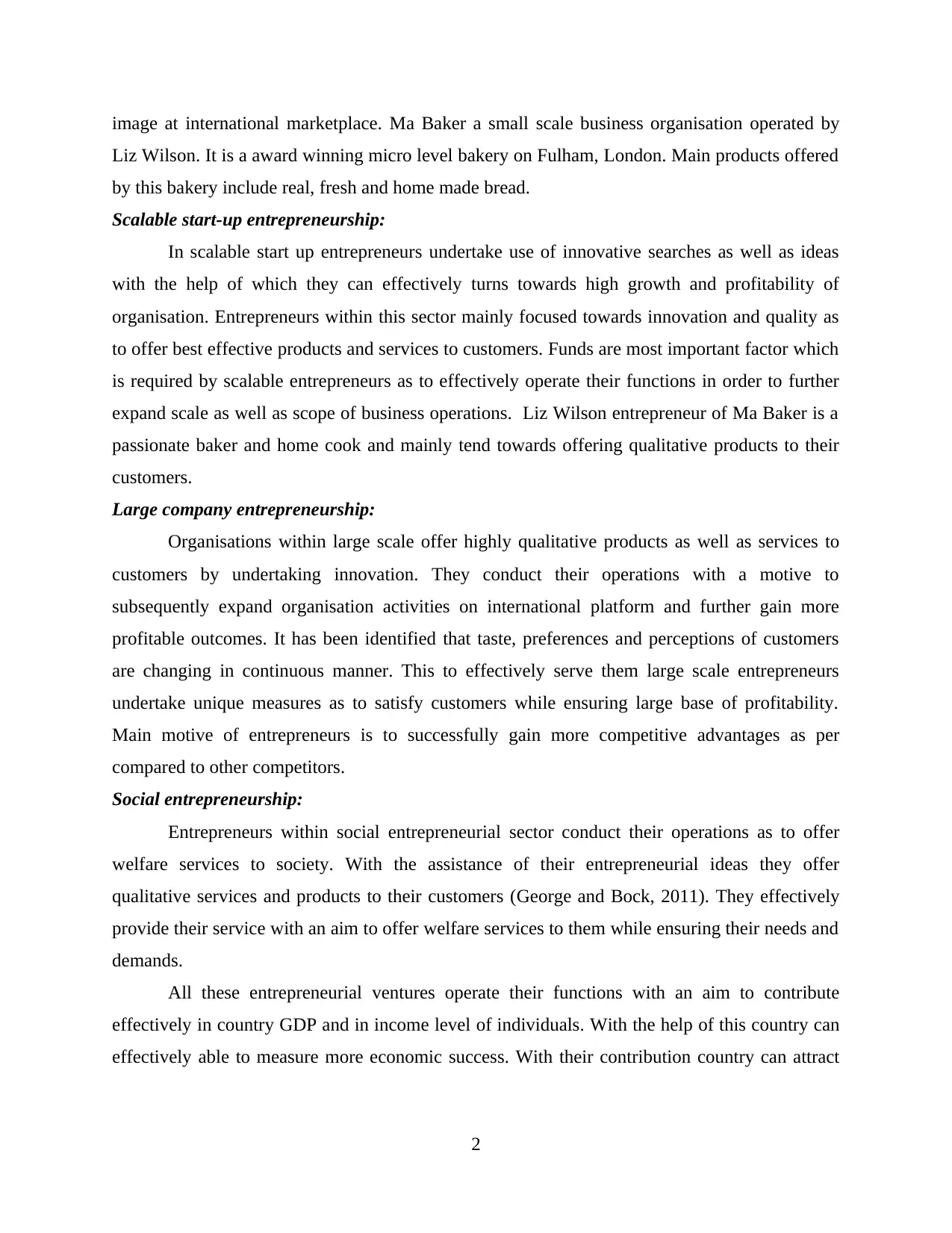
image at international marketplace. Ma Baker a small scale business organisation operated by
Liz Wilson. It is a award winning micro level bakery on Fulham, London. Main products offered
by this bakery include real, fresh and home made bread.
Scalable start-up entrepreneurship:
In scalable start up entrepreneurs undertake use of innovative searches as well as ideas
with the help of which they can effectively turns towards high growth and profitability of
organisation. Entrepreneurs within this sector mainly focused towards innovation and quality as
to offer best effective products and services to customers. Funds are most important factor which
is required by scalable entrepreneurs as to effectively operate their functions in order to further
expand scale as well as scope of business operations. Liz Wilson entrepreneur of Ma Baker is a
passionate baker and home cook and mainly tend towards offering qualitative products to their
customers.
Large company entrepreneurship:
Organisations within large scale offer highly qualitative products as well as services to
customers by undertaking innovation. They conduct their operations with a motive to
subsequently expand organisation activities on international platform and further gain more
profitable outcomes. It has been identified that taste, preferences and perceptions of customers
are changing in continuous manner. This to effectively serve them large scale entrepreneurs
undertake unique measures as to satisfy customers while ensuring large base of profitability.
Main motive of entrepreneurs is to successfully gain more competitive advantages as per
compared to other competitors.
Social entrepreneurship:
Entrepreneurs within social entrepreneurial sector conduct their operations as to offer
welfare services to society. With the assistance of their entrepreneurial ideas they offer
qualitative services and products to their customers (George and Bock, 2011). They effectively
provide their service with an aim to offer welfare services to them while ensuring their needs and
demands.
All these entrepreneurial ventures operate their functions with an aim to contribute
effectively in country GDP and in income level of individuals. With the help of this country can
effectively able to measure more economic success. With their contribution country can attract
2
Liz Wilson. It is a award winning micro level bakery on Fulham, London. Main products offered
by this bakery include real, fresh and home made bread.
Scalable start-up entrepreneurship:
In scalable start up entrepreneurs undertake use of innovative searches as well as ideas
with the help of which they can effectively turns towards high growth and profitability of
organisation. Entrepreneurs within this sector mainly focused towards innovation and quality as
to offer best effective products and services to customers. Funds are most important factor which
is required by scalable entrepreneurs as to effectively operate their functions in order to further
expand scale as well as scope of business operations. Liz Wilson entrepreneur of Ma Baker is a
passionate baker and home cook and mainly tend towards offering qualitative products to their
customers.
Large company entrepreneurship:
Organisations within large scale offer highly qualitative products as well as services to
customers by undertaking innovation. They conduct their operations with a motive to
subsequently expand organisation activities on international platform and further gain more
profitable outcomes. It has been identified that taste, preferences and perceptions of customers
are changing in continuous manner. This to effectively serve them large scale entrepreneurs
undertake unique measures as to satisfy customers while ensuring large base of profitability.
Main motive of entrepreneurs is to successfully gain more competitive advantages as per
compared to other competitors.
Social entrepreneurship:
Entrepreneurs within social entrepreneurial sector conduct their operations as to offer
welfare services to society. With the assistance of their entrepreneurial ideas they offer
qualitative services and products to their customers (George and Bock, 2011). They effectively
provide their service with an aim to offer welfare services to them while ensuring their needs and
demands.
All these entrepreneurial ventures operate their functions with an aim to contribute
effectively in country GDP and in income level of individuals. With the help of this country can
effectively able to measure more economic success. With their contribution country can attract
2
Paraphrase This Document
Need a fresh take? Get an instant paraphrase of this document with our AI Paraphraser
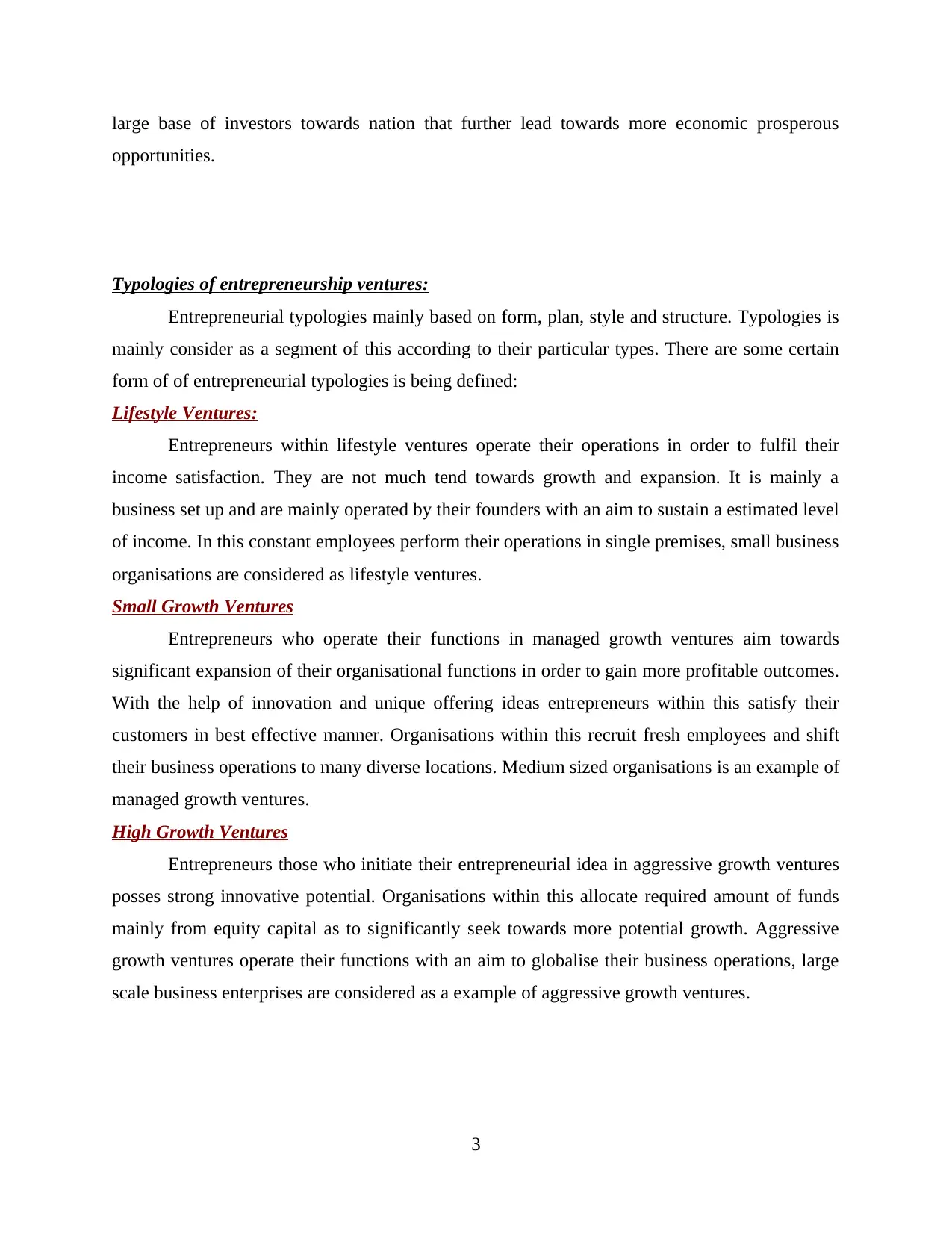
large base of investors towards nation that further lead towards more economic prosperous
opportunities.
Typologies of entrepreneurship ventures:
Entrepreneurial typologies mainly based on form, plan, style and structure. Typologies is
mainly consider as a segment of this according to their particular types. There are some certain
form of of entrepreneurial typologies is being defined:
Lifestyle Ventures:
Entrepreneurs within lifestyle ventures operate their operations in order to fulfil their
income satisfaction. They are not much tend towards growth and expansion. It is mainly a
business set up and are mainly operated by their founders with an aim to sustain a estimated level
of income. In this constant employees perform their operations in single premises, small business
organisations are considered as lifestyle ventures.
Small Growth Ventures
Entrepreneurs who operate their functions in managed growth ventures aim towards
significant expansion of their organisational functions in order to gain more profitable outcomes.
With the help of innovation and unique offering ideas entrepreneurs within this satisfy their
customers in best effective manner. Organisations within this recruit fresh employees and shift
their business operations to many diverse locations. Medium sized organisations is an example of
managed growth ventures.
High Growth Ventures
Entrepreneurs those who initiate their entrepreneurial idea in aggressive growth ventures
posses strong innovative potential. Organisations within this allocate required amount of funds
mainly from equity capital as to significantly seek towards more potential growth. Aggressive
growth ventures operate their functions with an aim to globalise their business operations, large
scale business enterprises are considered as a example of aggressive growth ventures.
3
opportunities.
Typologies of entrepreneurship ventures:
Entrepreneurial typologies mainly based on form, plan, style and structure. Typologies is
mainly consider as a segment of this according to their particular types. There are some certain
form of of entrepreneurial typologies is being defined:
Lifestyle Ventures:
Entrepreneurs within lifestyle ventures operate their operations in order to fulfil their
income satisfaction. They are not much tend towards growth and expansion. It is mainly a
business set up and are mainly operated by their founders with an aim to sustain a estimated level
of income. In this constant employees perform their operations in single premises, small business
organisations are considered as lifestyle ventures.
Small Growth Ventures
Entrepreneurs who operate their functions in managed growth ventures aim towards
significant expansion of their organisational functions in order to gain more profitable outcomes.
With the help of innovation and unique offering ideas entrepreneurs within this satisfy their
customers in best effective manner. Organisations within this recruit fresh employees and shift
their business operations to many diverse locations. Medium sized organisations is an example of
managed growth ventures.
High Growth Ventures
Entrepreneurs those who initiate their entrepreneurial idea in aggressive growth ventures
posses strong innovative potential. Organisations within this allocate required amount of funds
mainly from equity capital as to significantly seek towards more potential growth. Aggressive
growth ventures operate their functions with an aim to globalise their business operations, large
scale business enterprises are considered as a example of aggressive growth ventures.
3
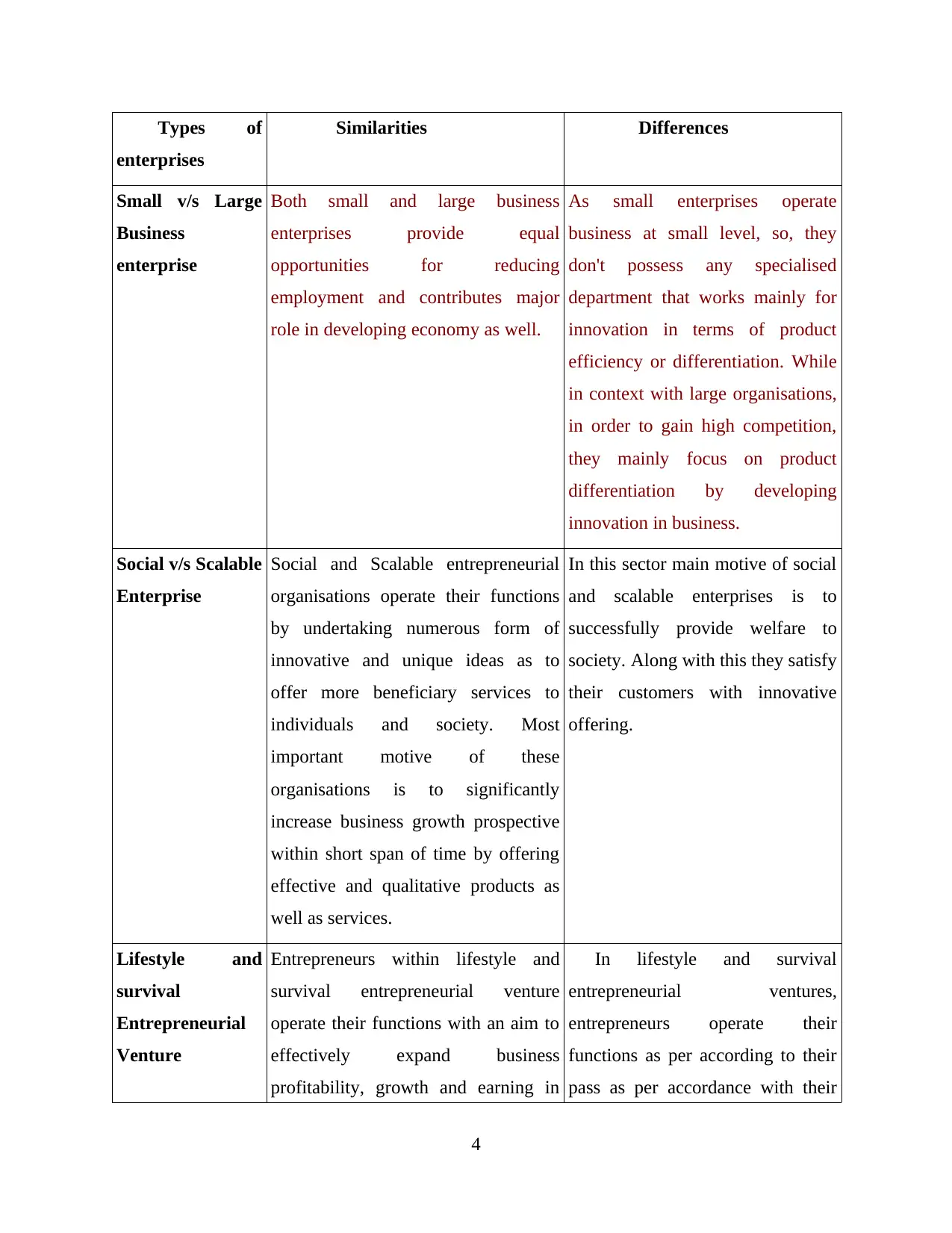
Types of
enterprises
Similarities Differences
Small v/s Large
Business
enterprise
Both small and large business
enterprises provide equal
opportunities for reducing
employment and contributes major
role in developing economy as well.
As small enterprises operate
business at small level, so, they
don't possess any specialised
department that works mainly for
innovation in terms of product
efficiency or differentiation. While
in context with large organisations,
in order to gain high competition,
they mainly focus on product
differentiation by developing
innovation in business.
Social v/s Scalable
Enterprise
Social and Scalable entrepreneurial
organisations operate their functions
by undertaking numerous form of
innovative and unique ideas as to
offer more beneficiary services to
individuals and society. Most
important motive of these
organisations is to significantly
increase business growth prospective
within short span of time by offering
effective and qualitative products as
well as services.
In this sector main motive of social
and scalable enterprises is to
successfully provide welfare to
society. Along with this they satisfy
their customers with innovative
offering.
Lifestyle and
survival
Entrepreneurial
Venture
Entrepreneurs within lifestyle and
survival entrepreneurial venture
operate their functions with an aim to
effectively expand business
profitability, growth and earning in
In lifestyle and survival
entrepreneurial ventures,
entrepreneurs operate their
functions as per according to their
pass as per accordance with their
4
enterprises
Similarities Differences
Small v/s Large
Business
enterprise
Both small and large business
enterprises provide equal
opportunities for reducing
employment and contributes major
role in developing economy as well.
As small enterprises operate
business at small level, so, they
don't possess any specialised
department that works mainly for
innovation in terms of product
efficiency or differentiation. While
in context with large organisations,
in order to gain high competition,
they mainly focus on product
differentiation by developing
innovation in business.
Social v/s Scalable
Enterprise
Social and Scalable entrepreneurial
organisations operate their functions
by undertaking numerous form of
innovative and unique ideas as to
offer more beneficiary services to
individuals and society. Most
important motive of these
organisations is to significantly
increase business growth prospective
within short span of time by offering
effective and qualitative products as
well as services.
In this sector main motive of social
and scalable enterprises is to
successfully provide welfare to
society. Along with this they satisfy
their customers with innovative
offering.
Lifestyle and
survival
Entrepreneurial
Venture
Entrepreneurs within lifestyle and
survival entrepreneurial venture
operate their functions with an aim to
effectively expand business
profitability, growth and earning in
In lifestyle and survival
entrepreneurial ventures,
entrepreneurs operate their
functions as per according to their
pass as per accordance with their
4
⊘ This is a preview!⊘
Do you want full access?
Subscribe today to unlock all pages.

Trusted by 1+ million students worldwide
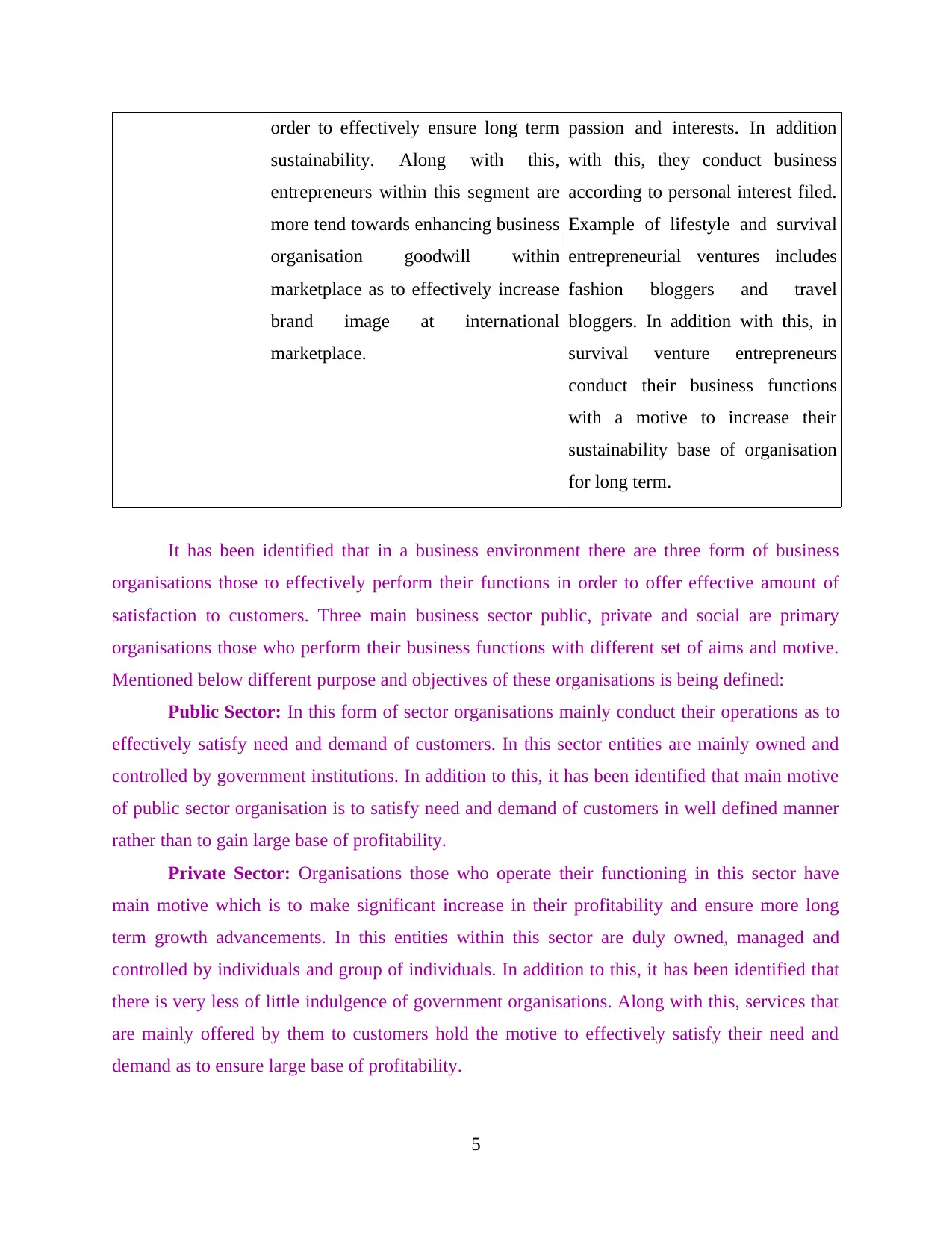
order to effectively ensure long term
sustainability. Along with this,
entrepreneurs within this segment are
more tend towards enhancing business
organisation goodwill within
marketplace as to effectively increase
brand image at international
marketplace.
passion and interests. In addition
with this, they conduct business
according to personal interest filed.
Example of lifestyle and survival
entrepreneurial ventures includes
fashion bloggers and travel
bloggers. In addition with this, in
survival venture entrepreneurs
conduct their business functions
with a motive to increase their
sustainability base of organisation
for long term.
It has been identified that in a business environment there are three form of business
organisations those to effectively perform their functions in order to offer effective amount of
satisfaction to customers. Three main business sector public, private and social are primary
organisations those who perform their business functions with different set of aims and motive.
Mentioned below different purpose and objectives of these organisations is being defined:
Public Sector: In this form of sector organisations mainly conduct their operations as to
effectively satisfy need and demand of customers. In this sector entities are mainly owned and
controlled by government institutions. In addition to this, it has been identified that main motive
of public sector organisation is to satisfy need and demand of customers in well defined manner
rather than to gain large base of profitability.
Private Sector: Organisations those who operate their functioning in this sector have
main motive which is to make significant increase in their profitability and ensure more long
term growth advancements. In this entities within this sector are duly owned, managed and
controlled by individuals and group of individuals. In addition to this, it has been identified that
there is very less of little indulgence of government organisations. Along with this, services that
are mainly offered by them to customers hold the motive to effectively satisfy their need and
demand as to ensure large base of profitability.
5
sustainability. Along with this,
entrepreneurs within this segment are
more tend towards enhancing business
organisation goodwill within
marketplace as to effectively increase
brand image at international
marketplace.
passion and interests. In addition
with this, they conduct business
according to personal interest filed.
Example of lifestyle and survival
entrepreneurial ventures includes
fashion bloggers and travel
bloggers. In addition with this, in
survival venture entrepreneurs
conduct their business functions
with a motive to increase their
sustainability base of organisation
for long term.
It has been identified that in a business environment there are three form of business
organisations those to effectively perform their functions in order to offer effective amount of
satisfaction to customers. Three main business sector public, private and social are primary
organisations those who perform their business functions with different set of aims and motive.
Mentioned below different purpose and objectives of these organisations is being defined:
Public Sector: In this form of sector organisations mainly conduct their operations as to
effectively satisfy need and demand of customers. In this sector entities are mainly owned and
controlled by government institutions. In addition to this, it has been identified that main motive
of public sector organisation is to satisfy need and demand of customers in well defined manner
rather than to gain large base of profitability.
Private Sector: Organisations those who operate their functioning in this sector have
main motive which is to make significant increase in their profitability and ensure more long
term growth advancements. In this entities within this sector are duly owned, managed and
controlled by individuals and group of individuals. In addition to this, it has been identified that
there is very less of little indulgence of government organisations. Along with this, services that
are mainly offered by them to customers hold the motive to effectively satisfy their need and
demand as to ensure large base of profitability.
5
Paraphrase This Document
Need a fresh take? Get an instant paraphrase of this document with our AI Paraphraser
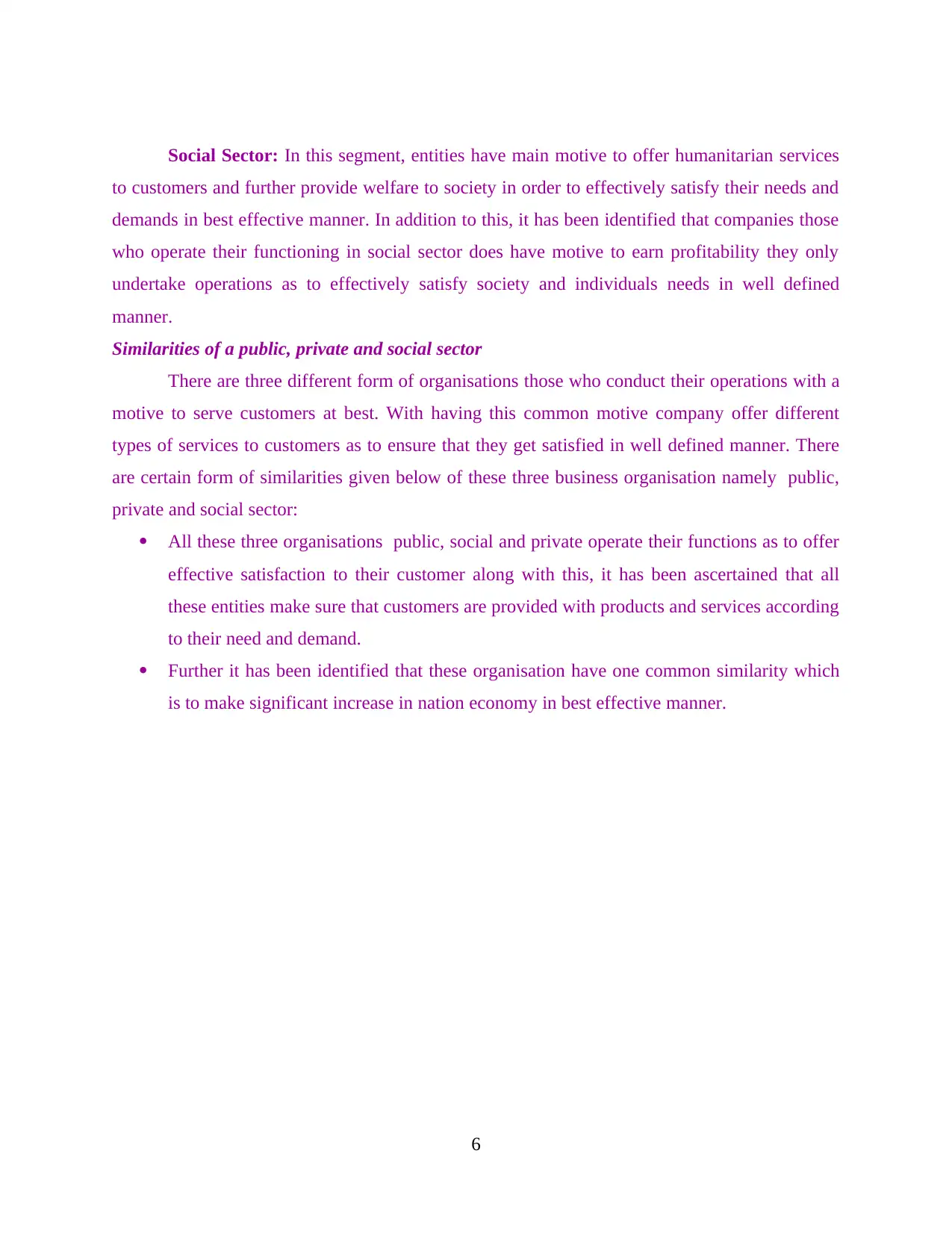
Social Sector: In this segment, entities have main motive to offer humanitarian services
to customers and further provide welfare to society in order to effectively satisfy their needs and
demands in best effective manner. In addition to this, it has been identified that companies those
who operate their functioning in social sector does have motive to earn profitability they only
undertake operations as to effectively satisfy society and individuals needs in well defined
manner.
Similarities of a public, private and social sector
There are three different form of organisations those who conduct their operations with a
motive to serve customers at best. With having this common motive company offer different
types of services to customers as to ensure that they get satisfied in well defined manner. There
are certain form of similarities given below of these three business organisation namely public,
private and social sector:
All these three organisations public, social and private operate their functions as to offer
effective satisfaction to their customer along with this, it has been ascertained that all
these entities make sure that customers are provided with products and services according
to their need and demand.
Further it has been identified that these organisation have one common similarity which
is to make significant increase in nation economy in best effective manner.
6
to customers and further provide welfare to society in order to effectively satisfy their needs and
demands in best effective manner. In addition to this, it has been identified that companies those
who operate their functioning in social sector does have motive to earn profitability they only
undertake operations as to effectively satisfy society and individuals needs in well defined
manner.
Similarities of a public, private and social sector
There are three different form of organisations those who conduct their operations with a
motive to serve customers at best. With having this common motive company offer different
types of services to customers as to ensure that they get satisfied in well defined manner. There
are certain form of similarities given below of these three business organisation namely public,
private and social sector:
All these three organisations public, social and private operate their functions as to offer
effective satisfaction to their customer along with this, it has been ascertained that all
these entities make sure that customers are provided with products and services according
to their need and demand.
Further it has been identified that these organisation have one common similarity which
is to make significant increase in nation economy in best effective manner.
6
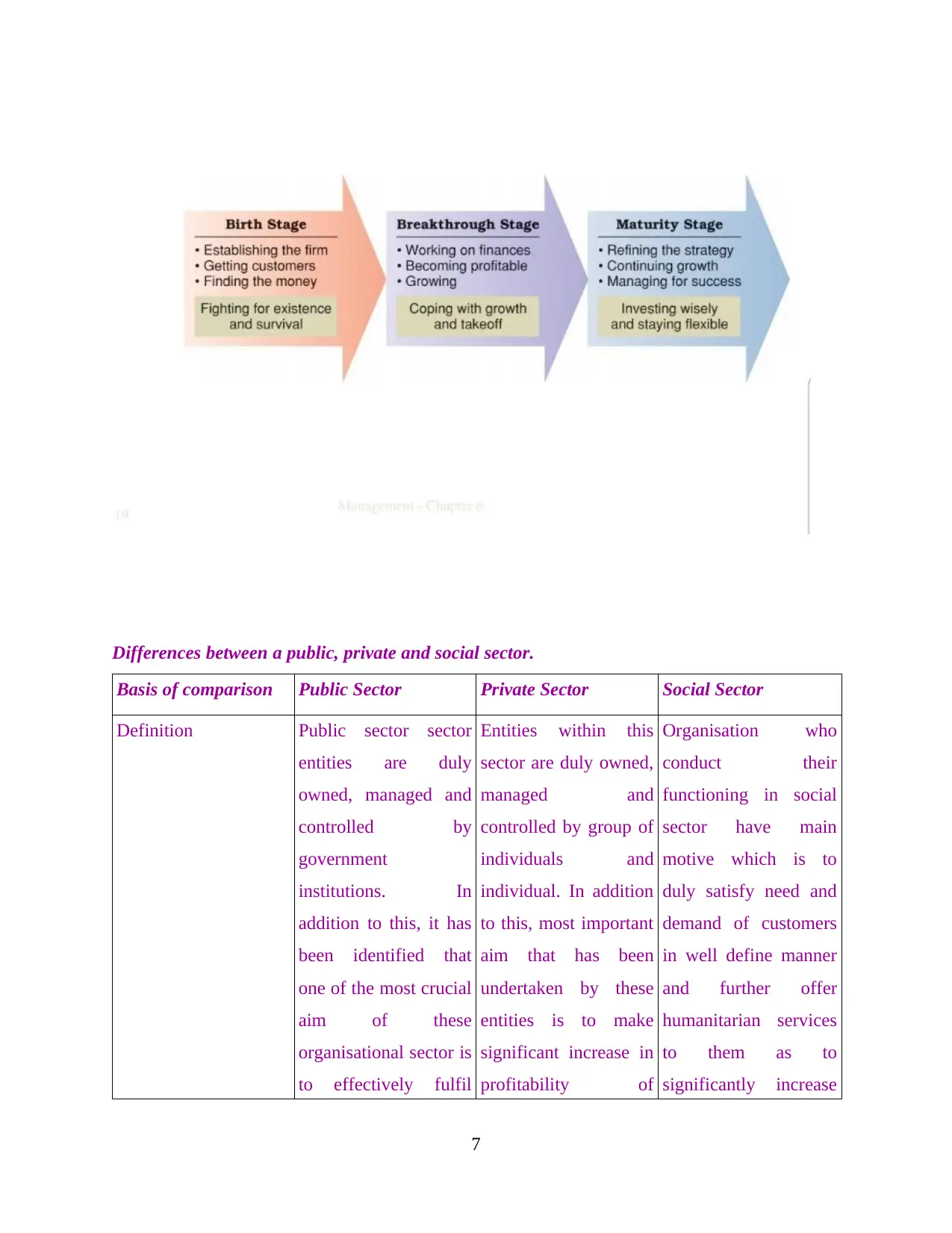
Differences between a public, private and social sector.
Basis of comparison Public Sector Private Sector Social Sector
Definition Public sector sector
entities are duly
owned, managed and
controlled by
government
institutions. In
addition to this, it has
been identified that
one of the most crucial
aim of these
organisational sector is
to effectively fulfil
Entities within this
sector are duly owned,
managed and
controlled by group of
individuals and
individual. In addition
to this, most important
aim that has been
undertaken by these
entities is to make
significant increase in
profitability of
Organisation who
conduct their
functioning in social
sector have main
motive which is to
duly satisfy need and
demand of customers
in well define manner
and further offer
humanitarian services
to them as to
significantly increase
7
Basis of comparison Public Sector Private Sector Social Sector
Definition Public sector sector
entities are duly
owned, managed and
controlled by
government
institutions. In
addition to this, it has
been identified that
one of the most crucial
aim of these
organisational sector is
to effectively fulfil
Entities within this
sector are duly owned,
managed and
controlled by group of
individuals and
individual. In addition
to this, most important
aim that has been
undertaken by these
entities is to make
significant increase in
profitability of
Organisation who
conduct their
functioning in social
sector have main
motive which is to
duly satisfy need and
demand of customers
in well define manner
and further offer
humanitarian services
to them as to
significantly increase
7
⊘ This is a preview!⊘
Do you want full access?
Subscribe today to unlock all pages.

Trusted by 1+ million students worldwide
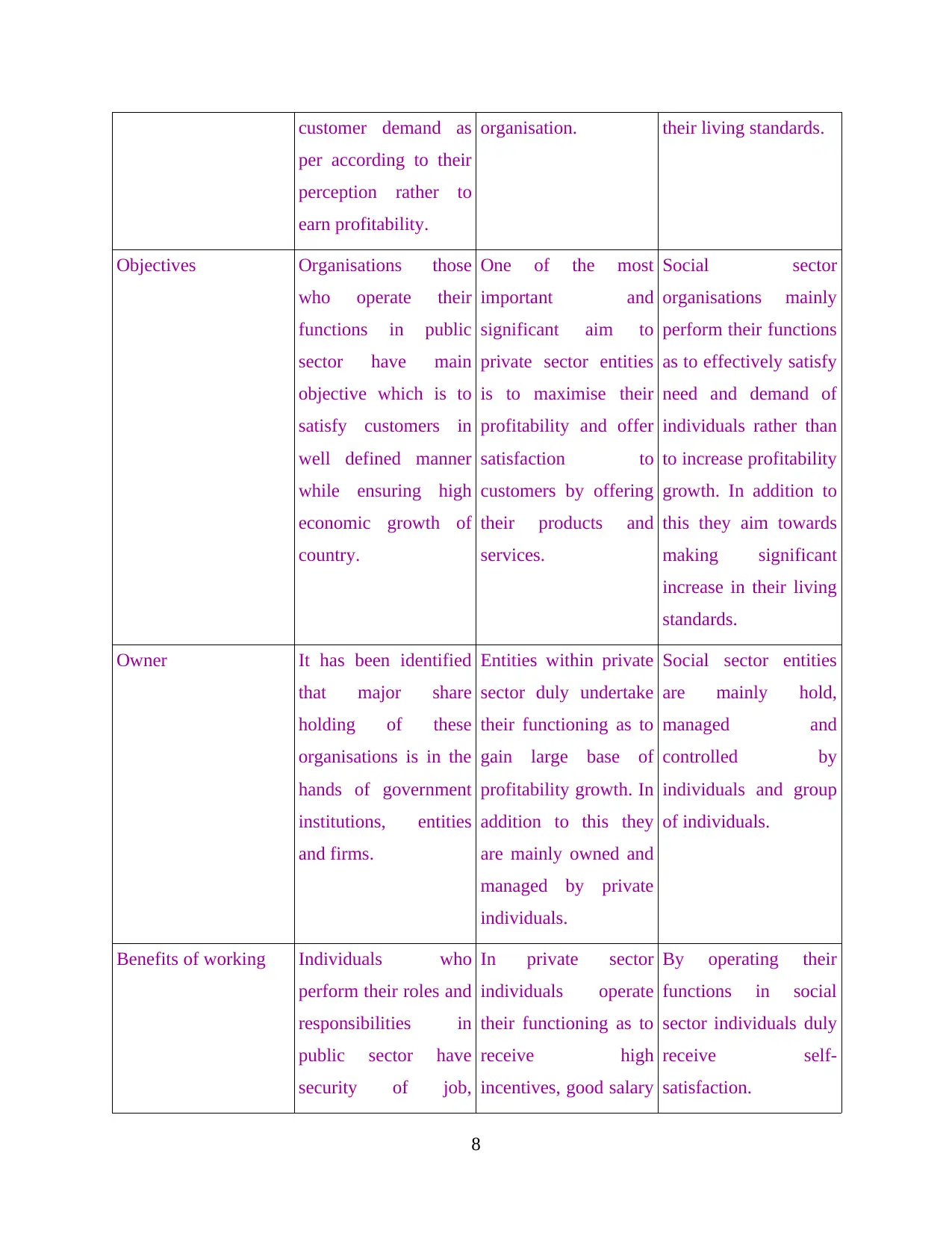
customer demand as
per according to their
perception rather to
earn profitability.
organisation. their living standards.
Objectives Organisations those
who operate their
functions in public
sector have main
objective which is to
satisfy customers in
well defined manner
while ensuring high
economic growth of
country.
One of the most
important and
significant aim to
private sector entities
is to maximise their
profitability and offer
satisfaction to
customers by offering
their products and
services.
Social sector
organisations mainly
perform their functions
as to effectively satisfy
need and demand of
individuals rather than
to increase profitability
growth. In addition to
this they aim towards
making significant
increase in their living
standards.
Owner It has been identified
that major share
holding of these
organisations is in the
hands of government
institutions, entities
and firms.
Entities within private
sector duly undertake
their functioning as to
gain large base of
profitability growth. In
addition to this they
are mainly owned and
managed by private
individuals.
Social sector entities
are mainly hold,
managed and
controlled by
individuals and group
of individuals.
Benefits of working Individuals who
perform their roles and
responsibilities in
public sector have
security of job,
In private sector
individuals operate
their functioning as to
receive high
incentives, good salary
By operating their
functions in social
sector individuals duly
receive self-
satisfaction.
8
per according to their
perception rather to
earn profitability.
organisation. their living standards.
Objectives Organisations those
who operate their
functions in public
sector have main
objective which is to
satisfy customers in
well defined manner
while ensuring high
economic growth of
country.
One of the most
important and
significant aim to
private sector entities
is to maximise their
profitability and offer
satisfaction to
customers by offering
their products and
services.
Social sector
organisations mainly
perform their functions
as to effectively satisfy
need and demand of
individuals rather than
to increase profitability
growth. In addition to
this they aim towards
making significant
increase in their living
standards.
Owner It has been identified
that major share
holding of these
organisations is in the
hands of government
institutions, entities
and firms.
Entities within private
sector duly undertake
their functioning as to
gain large base of
profitability growth. In
addition to this they
are mainly owned and
managed by private
individuals.
Social sector entities
are mainly hold,
managed and
controlled by
individuals and group
of individuals.
Benefits of working Individuals who
perform their roles and
responsibilities in
public sector have
security of job,
In private sector
individuals operate
their functioning as to
receive high
incentives, good salary
By operating their
functions in social
sector individuals duly
receive self-
satisfaction.
8
Paraphrase This Document
Need a fresh take? Get an instant paraphrase of this document with our AI Paraphraser
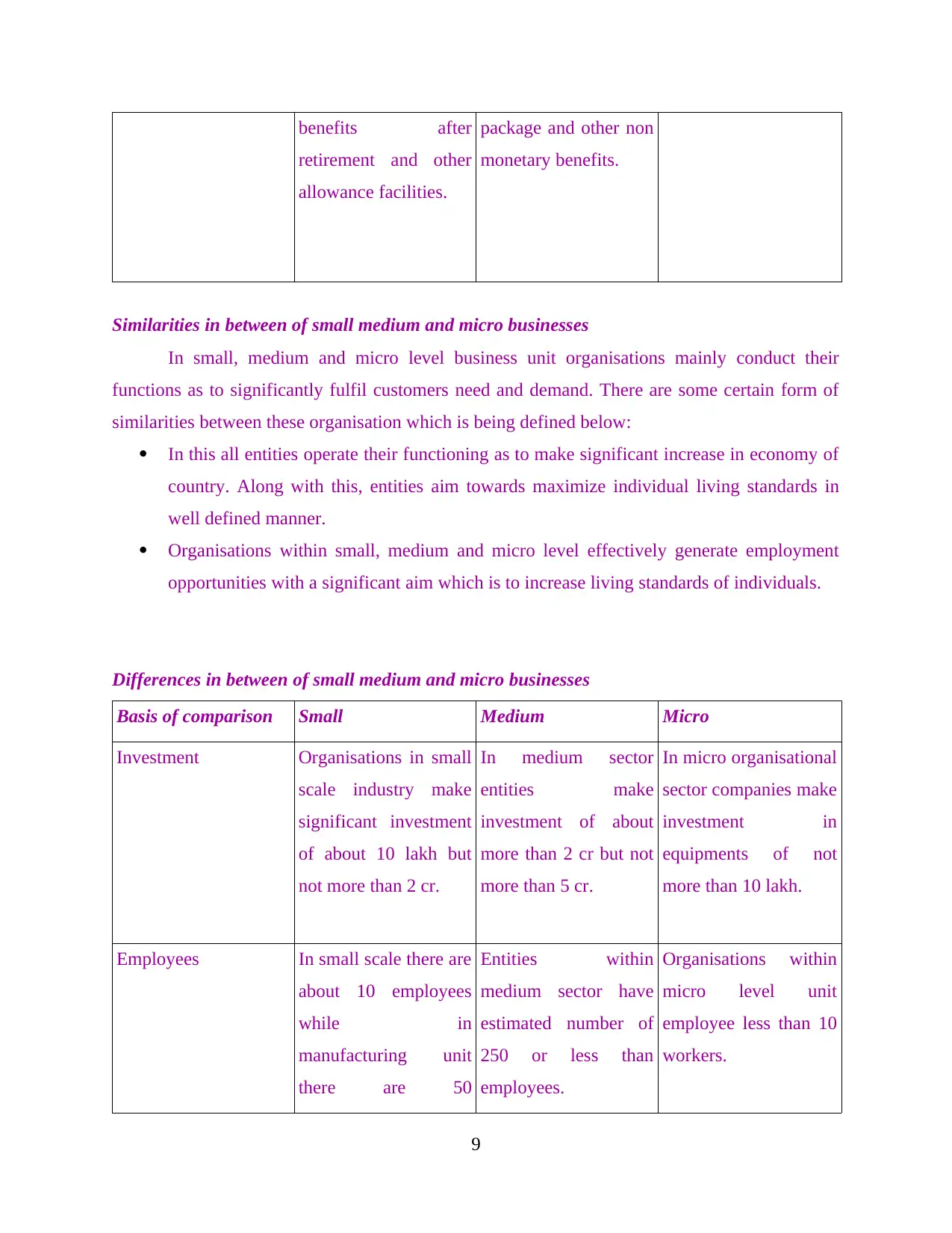
benefits after
retirement and other
allowance facilities.
package and other non
monetary benefits.
Similarities in between of small medium and micro businesses
In small, medium and micro level business unit organisations mainly conduct their
functions as to significantly fulfil customers need and demand. There are some certain form of
similarities between these organisation which is being defined below:
In this all entities operate their functioning as to make significant increase in economy of
country. Along with this, entities aim towards maximize individual living standards in
well defined manner.
Organisations within small, medium and micro level effectively generate employment
opportunities with a significant aim which is to increase living standards of individuals.
Differences in between of small medium and micro businesses
Basis of comparison Small Medium Micro
Investment Organisations in small
scale industry make
significant investment
of about 10 lakh but
not more than 2 cr.
In medium sector
entities make
investment of about
more than 2 cr but not
more than 5 cr.
In micro organisational
sector companies make
investment in
equipments of not
more than 10 lakh.
Employees In small scale there are
about 10 employees
while in
manufacturing unit
there are 50
Entities within
medium sector have
estimated number of
250 or less than
employees.
Organisations within
micro level unit
employee less than 10
workers.
9
retirement and other
allowance facilities.
package and other non
monetary benefits.
Similarities in between of small medium and micro businesses
In small, medium and micro level business unit organisations mainly conduct their
functions as to significantly fulfil customers need and demand. There are some certain form of
similarities between these organisation which is being defined below:
In this all entities operate their functioning as to make significant increase in economy of
country. Along with this, entities aim towards maximize individual living standards in
well defined manner.
Organisations within small, medium and micro level effectively generate employment
opportunities with a significant aim which is to increase living standards of individuals.
Differences in between of small medium and micro businesses
Basis of comparison Small Medium Micro
Investment Organisations in small
scale industry make
significant investment
of about 10 lakh but
not more than 2 cr.
In medium sector
entities make
investment of about
more than 2 cr but not
more than 5 cr.
In micro organisational
sector companies make
investment in
equipments of not
more than 10 lakh.
Employees In small scale there are
about 10 employees
while in
manufacturing unit
there are 50
Entities within
medium sector have
estimated number of
250 or less than
employees.
Organisations within
micro level unit
employee less than 10
workers.
9
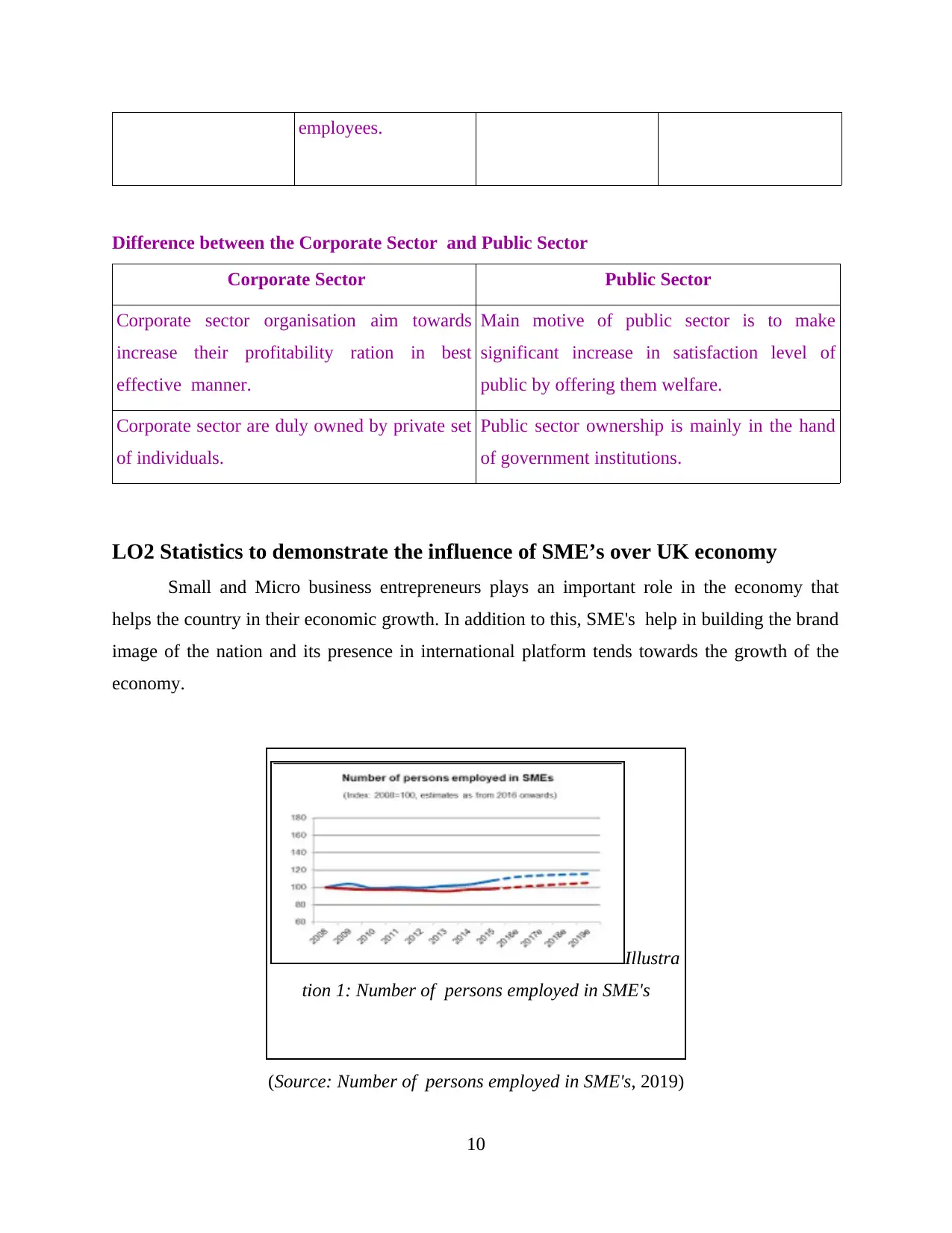
employees.
Difference between the Corporate Sector and Public Sector
Corporate Sector Public Sector
Corporate sector organisation aim towards
increase their profitability ration in best
effective manner.
Main motive of public sector is to make
significant increase in satisfaction level of
public by offering them welfare.
Corporate sector are duly owned by private set
of individuals.
Public sector ownership is mainly in the hand
of government institutions.
LO2 Statistics to demonstrate the influence of SME’s over UK economy
Small and Micro business entrepreneurs plays an important role in the economy that
helps the country in their economic growth. In addition to this, SME's help in building the brand
image of the nation and its presence in international platform tends towards the growth of the
economy.
(Source: Number of persons employed in SME's, 2019)
10
Illustra
tion 1: Number of persons employed in SME's
Difference between the Corporate Sector and Public Sector
Corporate Sector Public Sector
Corporate sector organisation aim towards
increase their profitability ration in best
effective manner.
Main motive of public sector is to make
significant increase in satisfaction level of
public by offering them welfare.
Corporate sector are duly owned by private set
of individuals.
Public sector ownership is mainly in the hand
of government institutions.
LO2 Statistics to demonstrate the influence of SME’s over UK economy
Small and Micro business entrepreneurs plays an important role in the economy that
helps the country in their economic growth. In addition to this, SME's help in building the brand
image of the nation and its presence in international platform tends towards the growth of the
economy.
(Source: Number of persons employed in SME's, 2019)
10
Illustra
tion 1: Number of persons employed in SME's
⊘ This is a preview!⊘
Do you want full access?
Subscribe today to unlock all pages.

Trusted by 1+ million students worldwide
1 out of 21
Related Documents
Your All-in-One AI-Powered Toolkit for Academic Success.
+13062052269
info@desklib.com
Available 24*7 on WhatsApp / Email
![[object Object]](/_next/static/media/star-bottom.7253800d.svg)
Unlock your academic potential
Copyright © 2020–2026 A2Z Services. All Rights Reserved. Developed and managed by ZUCOL.





